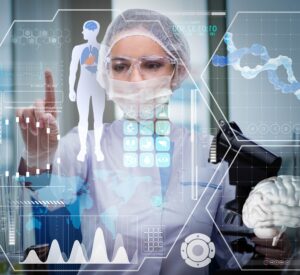You live in an exciting time for personal computing. Artificial intelligence is transforming the way computer manufacturers design and build the devices you use every day. Soon, your next laptop or desktop PC will be engineered partially by AI, resulting in more powerful and efficient machines. Major players in the PC industry are already implementing smart manufacturing techniques like predictive analytics and adaptive robotics. As this technology matures, you can expect more customized and capable computers. AI is enabling PC makers to build the smartest, fastest, and most reliable computers yet. The future of personal computing looks brighter than ever thanks to artificial intelligence.
The Rise of AI in PC Manufacturing
Automating and Optimizing the Assembly Line
Artificial intelligence is transforming how PCs are manufactured. AI technologies like computer vision and predictive analytics are being implemented to automate and optimize assembly line processes. Computer vision systems can detect defects in components with superhuman accuracy, ensuring only flawless parts move along the line. Predictive analytics anticipate potential issues, allowing manufacturers to make data-driven changes to improve efficiency and quality.
Customizing at Scale
AI also enables PC manufacturers to achieve customized, large-scale production. Using AI, companies can gain deep insights into what customers want in their devices. They can then produce PCs with specifically tailored components, software, and features to match customers’ needs. Each PC may have a unique combination of elements, yet still be produced rapidly and cost-effectively. Dell, for example, uses AI to design PCs tailored to the needs of individual business customers.
The Future of AI in Manufacturing
Looking ahead, AI will become even more integral to PC manufacturing. Improvements in robotics, computer vision, and generative design will make automated assembly lines faster, more flexible, and able to produce increasingly customized PCs. AI will help companies optimize their supply chains to minimize costs and environmental impact. And as 5G networks enable new capabilities like remote-controlled robots, PC manufacturing may become distributed and localized. AI is transforming PC manufacturing to be faster, smarter, and more sustainable, with the ultimate goal of better serving customers.
How AI Is Revolutionizing PC Component Design
Artificial intelligence has enabled PC manufacturers to implement advanced techniques like machine learning and neural networks to help design next-generation computer components.

Improved Processing Power
AI systems can analyze huge datasets to identify patterns and insights that human engineers may miss. GPU makers are tapping into AI to create chips with thousands of cores optimized for running machine learning models, enabling faster training of AI systems. Similarly, CPU makers are using AI to design more efficient processor architectures tailored to various workloads. The end result for users will be PCs with significantly improved processing power and performance.
Enhanced Graphics
Graphics card manufacturers are leveraging AI to build GPUs with higher compute power and more stream processors designed specifically for rendering complex graphics. AI-designed GPUs will enable higher frame rates for gaming, faster video editing and rendering, and a better experience with graphically-intensive applications. For the average PC user, this could mean seamless playback of 8K videos, virtual reality content, and other high-fidelity media.
Improved Energy Efficiency
AI can help identify ways to optimize chip designs to reduce power consumption and improve energy efficiency. By analyzing huge volumes of data on how chips perform under different conditions, AI systems can pinpoint areas where power is being wasted and suggest design tweaks to address these inefficiencies. The result will be PC components that offer substantially improved performance per watt, enabling faster and more powerful PCs with longer battery life.
Continued Innovation
With AI and machine learning, PC manufacturers now have a powerful tool to help accelerate the design of next-generation components. AI won’t replace human engineers but will augment their capabilities, allowing them to explore more design possibilities in less time. This symbiosis of human and AI will drive continued progress in making PCs faster, more energy efficient, and capable of amazing new experiences. The future of PCs powered by AI is very bright.
AI-Optimized Manufacturing Processes and Quality Control
Advancements in AI are enabling PC manufacturers to optimize their assembly line processes and quality control mechanisms. AI systems can analyze manufacturing data to identify inefficiencies and recommend improvements. For example, AI may determine that changing the order of certain assembly steps could increase throughput. AI can also monitor equipment performance in real time to predict failures before they happen and schedule preventative maintenance.

Streamlined Production
AI leverages data from sensors and equipment to dynamically adjust manufacturing parameters for optimal output. It may redistribute workloads between stations based on predicted workloads and throughput. AI can also optimize the flow and allocation of materials and components on the assembly line to minimize work in progress and ensure a smooth flow. These AI-driven optimizations reduce costs and maximize productivity.
Enhanced Quality Control
AI enhances quality control by automatically inspecting components, identifying defects, and alerting technicians before defective parts are incorporated into PCs. AI systems with computer vision and machine learning are trained on thousands of images to detect anomalies in components. They can spot issues human inspectors might miss. AI also analyzes data from quality testing equipment to identify patterns that lead to failures. Technicians can then take corrective actions to address root causes and prevent quality problems.
AI will transform PC manufacturing through intelligent and automated processes that boost efficiency, reduce costs, and ensure the highest quality products. By optimizing workflows, maximizing throughput, minimizing errors, and enhancing quality control, AI paves the way for more affordable yet robust PCs. Manufacturers adopting AI will gain a competitive advantage in cost, quality, and customer satisfaction. For PC buyers, it means faster, less expensive, and more reliable computers. Overall, AI will help propel technological progress in an industry that powers countless aspects of work and life.
The Benefits of AI-Powered PCs for the End User
Increased Personalization
AI-powered PCs can learn users’ preferences and patterns of behavior over time to provide a highly personalized experience. For example, an AI assistant may suggest apps, settings, and workflows tailored to how you specifically use your device. It can also pre-load your frequently used apps and files, and even adjust elements like screen brightness based on your habits. This level of personalization creates a seamless user experience that helps you accomplish tasks more efficiently.
Improved Performance
AI technologies like machine learning are enabling PC manufacturers to build “smarter” systems that optimize performance over time. An AI-powered PC can analyze how you use your device and automatically adjust system resources to improve speed and responsiveness for your unique needs. For instance, it may temporarily boost CPU power and memory allocation for graphics-intensive tasks like video editing or gaming. Then it can dial back resources for less demanding activities to maximize battery life and efficiency.
Enhanced Security
AI shows promise for strengthening security and privacy on PCs. Machine learning systems can detect and block sophisticated malware, phishing attempts, and other cyber threats that signature-based solutions might miss. AI can also analyze users’ login patterns and behavior to identify anomalies that may indicate account compromise. Some PC makers are developing AI security software that runs locally on devices to protect user data and privacy. These AI-powered security solutions will provide end users with robust, multifactor protection for their digital lives.
In summary, AI-powered advancements in PC manufacturing will ultimately benefit end users through personalized, optimized, and secure computing experiences. While AI technologies are still evolving, PC makers are well positioned to leverage their potential for developing a new generation of intelligent systems tailored to individual needs. The future of AI on PCs looks promising for both enhanced user experiences and privacy.
The Future of AI in Personal Computing: What’s Next?
- AI-Powered PCs : Personal computer manufacturers are integrating AI into their products to provide an enhanced user experience. AI-powered PCs can dynamically adapt to users’ needs by learning their preferences and patterns of behavior. For example, AI may customize the desktop layout, suggest frequently used applications and files, or optimize system resources based on usage. Over time, these AI systems become very adept at streamlining the user experience and maximizing productivity.
- Virtual Assistants : Many PC makers now offer built-in virtual assistants that can understand natural language and respond to user requests. These AI assistants may help with various computing tasks like managing files, scheduling appointments, and controlling smart home devices. They continue to become more advanced, with the ability to have complex multi-turn conversations and accomplish more sophisticated goals. Virtual assistants represent an important step toward truly intelligent PCs that interact with and assist users in a very human-like way.
- Biometrics and Security : AI is enabling new ways of interacting with PCs, such as through touch, voice, and facial recognition. These biometric interfaces not only provide a natural user experience but also enhance security. AI systems can learn to recognize an individual user’s face, voice, typing cadence, and other attributes. They then allow access only to authorized users, blocking imposters and other threats. AI is poised to make PCs more secure than ever before through advanced biometric authentication and machine learning-based detection of malware or network intrusions.
To Sum It Up!
In the coming years, AI will transform personal computing in remarkable ways. PCs will become far more intelligent, adaptive, and attuned to individual users. Through virtual assistants, enhanced interfaces, and beefed-up security powered by AI, the traditional PC experience will be redefined. The future of AI on PCs looks extremely promising.
Through AI-powered advancements, PC manufacturing is undergoing a profound transformation. As you have learned, manufacturers like Dell, HP, and Lenovo are leveraging AI to streamline production, enhance quality control, and enable mass customization. With the help of machine learning algorithms, they can respond to market demands with unprecedented speed and precision. While AI will inevitably change the nature of work on assembly lines, it also presents exciting opportunities. Workers can upskill to take on more strategic roles that augment automated processes. As consumers, we stand to benefit from more powerful, reliable, and personalized devices. The future of AI in PC manufacturing is bright, but we must thoughtfully guide its implementation to maximize benefits for businesses, workers, and end users alike.
More Stories
BNP Paribas Banks on IBM Cloud to Fortify Financial Resilience
BNP Paribas, one of the world’s largest banks, has recently taken a significant step in its digital transformation journey.
Spark New Zealand Seeks Co-Investor for Data Center Portfolio in NZ$1.2 Billion Stake Sale
Spark New Zealand is taking strategic action to meet rising demand for data center services through a major capital-raising initiative.
Meta’s $72 Billion AI Bet Collides with Trade Tariff Turbulence
Specifically, the $72 billion investment in AI from Meta has met global trade tensions head-on. As a result, this collision has produced complex consequences with wide-ranging impact.
Maya’s Digital Credit Card: Empowering Filipinos with Instant, Inclusive Credit
Are you ready to enter a new era of financial empowerment in the Philippines? Maya’s Digital Credit Card changes how...
Kubernetes 1.33 “Octarine” Transforms Cloud-Native Infrastructure with AI-Ready Features
As you navigate the ever-evolving landscape of cloud-native infrastructure, Kubernetes 1.33 "Octarine" emerges as a game-changing release that promises to...
Microsoft’s AI Leap: Recall, Click to Do, and Smarter Search Redefine Copilot+ PCs
These tools—Recall, Click to Do, and improved Search—aim to enhance productivity and simplify digital tasks. As a result, users now gain access to AI-driven capabilities that integrate directly into their workflow.


